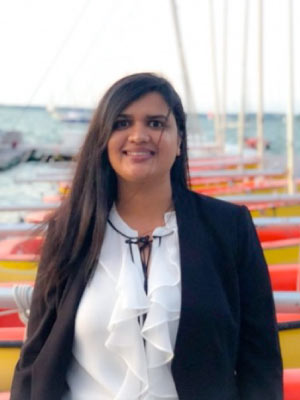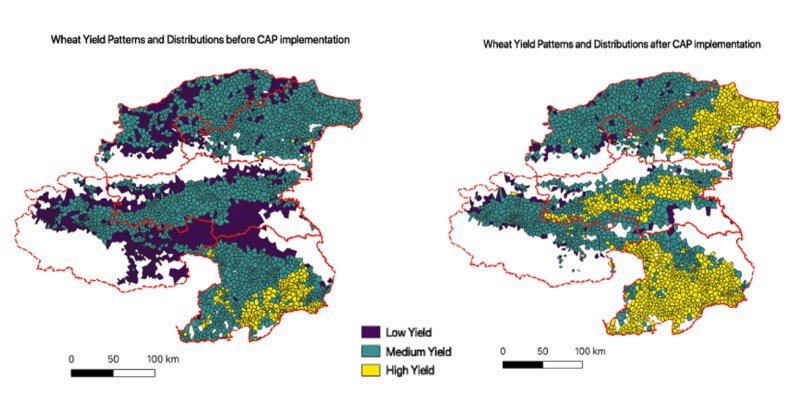
Using satellite data to expand sustainable farming is just one of the ways that Nelson Institute alumna Aparna Phalke is helping to improve global food security. As a Research Scientist and Agriculture, Food Security, and Water theme lead at NASA SERVIR in Huntsville, Alabama, Phalke helps developing countries use satellite data to address critical challenges related to food security, climate, and natural disasters. Using the data science skills she gained as a PhD candidate in the Nelson Institute Environment and Resources (ER)program, Phalke identifies advanced technologies and affordable solutions that help farmers and communities to increase food production while properly managing environmental resources.
This is an area of study that is close to Phalke’s heart. Growing up on a farm in India, Phalke says she witnessed farm families, including her own, facing challenges that were often brought about by a lack of resources or inequality. This inspired her to pursue a career that would help fellow farm families.
“As a scientist, I strive not only to build advanced technology for sustainable farming but also to make these tools and resources accessible to farmers from every corner of world,” said Phalke. “I also want to promote equality and develop the gender sensitive tools to help female farmers around the globe. Beyond the science, I also want to contribute to women empowerment. I have seen many women from rural parts of the world facing challenges for basic needs in their daily routine. I believe awareness and education can help them to understand their strengths and help them to make useful decisions to become independent.”
Through her work with the NASA SERVIR program, Phalke is using her expertise in environmental remote sensing to address some of these challenges. In particular, she is leading crop yield monitoring efforts with partners in Eastern and Southern Africa and also Southeast Asia (Mekong region) that will improve local food security. But, Phalke says she would not be able to do this work if it were not for her experience at the Nelson Institute.
“My student experience at the Nelson Institute was enriching as a researcher, student, and moreover as an empathetic human,” Phalke said. “I joined Nelson Institute in fall 2013 as a PhD student in the Environmental and Resources program and started working as a research assistant on NASA and United States Geological Survey (USGS) funded projects to study global food security using satellite data.”
Phalke shared that when she joined the Nelson Institute, she immediately felt supported by the community and specifically her advisor Mutlu Özdoğan, an associate professor in Forest & Wildlife Ecology and the Nelson Institute for Environmental Studies.
“In my research assistant tenure, my advisor Mutlu Özdoğan, helped me a lot by improving my research skills and also motivating me to lead the research work efficiently,” Phalke said. “I was lead researcher in developing the world’s first high-resolution, 30-m scale/field-scale, cropland extent mask product for Europe, the Middle-east, Russia and Central Asia regions. This work is published in highly cited international journals, as a book chapter, as well as published for public access in the NASA LPDAAC system. This work gave me the opportunity to work with well-known and established global leaders and organizations working in global food security analysis and the entire team experience helped me in my career tremendously.”

Phalke also extended thanks to her PhD committee which included Özdoğan, Department of Agriculture and Applied Economics professor Jeremy Folz, associate professor of Environmental Studies with the Center for Sustainability & the Global Environment (SAGE) Annemarie Schneider, Department of Forest and Wildlife Ecology professor Philip Townsend, and associate professor at the Space Research and Technology Institute with the Bulgarian Academy of Sciences (SRTI-BAS) Lachezar Filchev. Phalke also noted her appreciation for Prasad Thenkabail, a supervisory research geographer with USGS who served as principal investigator (PI) on her research project.
In addition to her lead research, Phalke was also involved in research studying field-scale cropping parameters through a novel remote sensing tool. Her PhD dissertation research investigated the various ways in which remotely sensing observations can improve crop area estimates from individual fields to entire countries and related the estimates to government-led agricultural support programs in the Eastern Mediterranean. Specifically, Phalke looked at how support policies impact agricultural land use changes and policies in the Mediterranean region through econometric modeling, advanced machine learning modeling, and advanced satellite data processing techniques.
Phalke said all of her research was supported by the courses she enrolled in through the Nelson Institute.
“Nelson Institute provided me with the opportunity to enroll into courses on basic and advanced remote sensing, agricultural ecosystems, and socioeconomics which were highly useful for my PhD research. I had opportunity to take coursework from interdisciplinary areas and it helped me in my PhD work where I needed to have knowledge on agronomy, agricultural support policies, remote sensing and geospatial technology, and computer programming,” Phalke said. “I enjoyed each and every course and seminar I took. Seminars by Annemarie Schneider, Holly Gibbs, and Philip Townsend had special impression on my work and basic and advanced remote sensing courses on environmental modeling by Mutlu Özdoğan helped me to build a base for my PhD research in algorithm development.”
Phalke also shared that her work experience as a teaching assistant and lecturer at the Nelson Institute enhanced her skills in teaching and provided her with the opportunity to work with instructors on curriculum development and teaching activities. She shared a special thank you to Nelson Institute director of International and Professional Programs Nathan Schulfer, Environmental Observations and Informatics coordinator Sarah Graves, Nelson Institute adjunct professor Arlyne Johnson, and associate director of the African Studies program Aleia McCord who helped Phalke to understand teaching and grant writing. She also extends thanks to Nelson Institute senior student services coordinator and graduate advisor Jim Miller.
Phalke now uses these skills to improve global food security and promote equality through her role with NASA SERVIR. Her professional work spans disciplines and continues to create impact globally, but she says she remains grateful for her experience at the Nelson Institute.
“My most meaningful professional accomplishment is my PhD degree completion,” Phalke said. “I am super grateful to everyone who supported this and very glad that I was able to contribute to societal welfare through my research.”
Learn more about Environment and Resources and how you can support the program.